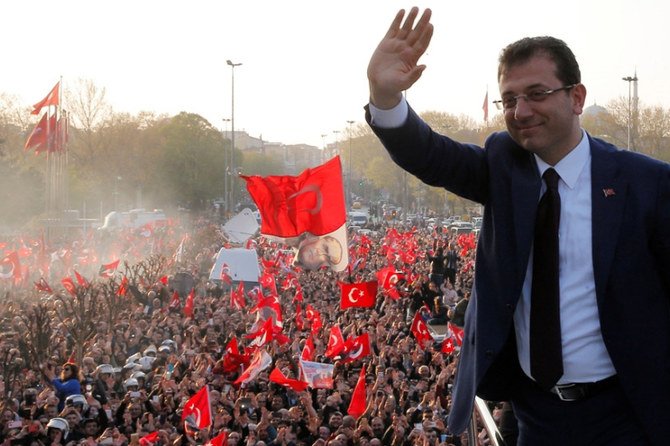
- ARAB NEWS
- 06 Jul 2025

Arab News
ANKARA: Turkish opposition figures are gaining ground among voters ahead of the country’s critical 2023 presidential elections and are likely to pose a major threat to President Recep Tayyip Erdogan and his ruling party, recent surveys show.
Istanbul mayor Ekrem Imamoglu and Ankara mayor Mansur Yavas, who head two opposition-controlled municipalities in Turkey’s largest cities, previously challenged Erdogan and his party in the March 2019 local elections.
And recent meetings between leaders of the opposition have hinted at efforts to develop a joint candidate figure who can appeal to wider segments of Turkish society.
The latest survey from Istanbul Economics, a leading research company, showed that Yavas and Imamoglu are now performing better than Erdogan in polls.
Results show that 52.5 percent of voters prefer Yavas against Erdogan’s 38.1 percent when asked who they would vote for if a presidential election was held today.
Similarly, 51.4 percent of voters would choose Imamoglu against Erdogan’s 39.9 percent in a presidential election. They would also prefer Meral Aksener, chairwoman of the center right IYI Party, with 45.4 percent, against Erdogan’s 39.1 percent.
The survey, titled Turkey Report, was conducted across 12 cities using 1506 respondents. The polling company recently revealed that popular support for the ruling Justice and Development Party (AKP) and its nationalist partner MHP was down to 45 percent, with the opposition standing at 55 percent.
The COVID-19 pandemic has also undermined trust in the government, due to perceived failures in handling the outbreak in Turkey.
Erdogan recently asked for “forgiveness” from Turks who have faced financial struggles due to pandemic restrictions and the subsequent economic downturn.
Dr. Berk Esen, a political scientist from Sabanci University in Istanbul, said that there are several reasons for the decline in Erdogan’s popularity in recent months.
“The pandemic has worsened the economic downturn that had already severely hit the urban poor, many of whom are loyal to the ruling party,” he told Arab News.
“Many voters feel that the Erdogan administration has done a poor job of dealing with the pandemic, both medically and economically,” Esen said.
“Although Turkey has been spared the catastrophe seen in other right-wing populist cases like Brazil and India, case numbers are still too high and vaccination efforts have not gone smoothly. Turkey has only managed to vaccinate 13 percent of its population and has experienced difficulty acquiring more vaccines from multiple sources,” he added.
The number of COVID-19 vaccinations administered in Turkey reached 25 million on Monday, however, over-reliance on China’s Sinovac jab and shipment delays thought to be politically motivated have put the country in a dangerous position amid surging infection rates.
The pandemic has also threatened the livelihoods of disadvantaged people in the country, with family suicides and bankruptcies of small business owners becoming more prevalent. Many people, including AKP voters, are beginning to feel left behind, Esen said.
“Government precautions against the pandemic are seen by many to be insufficient, scientifically not all that helpful, ill-planned and selectively applied. Such restrictions hurt local businesses and created unemployment across the country,” he added.
During the first quarter of 2021, about 29,000 shopkeepers closed their businesses, an increase of 11 percent compared with the same period in 2020.
Large pro-government rallies and other “super-spreader” events like mass protests have also sparked public outcry in the country. Many Turks have accused the government of double standards regarding pandemic measures, including social distancing rules.
Esen said that despite rising poverty and unemployment figures, the government has offered only limited social assistance to the poor, distributing less than most other OECD member countries.
“There is a growing sentiment among voters that the AKP treats its own members favorably thanks to cronyism, vast corruption schemes and shady business deals,” he added.
“Against this backdrop, opposition mayors of major metropolitan areas like Istanbul and Ankara have seen their popularity rise due to the increased reliance on social assistance by the urban poor and the provision of public services to low-income neighborhoods,” Esen said.
Another survey by Turkey’s Gezici research company found that 51 percent of respondents would vote for Kemal Kilicdaroglu, the leader of the main opposition Republican Peoples’ Party, against 49 percent for Erdogan in Turkey’s presidential election runoff.